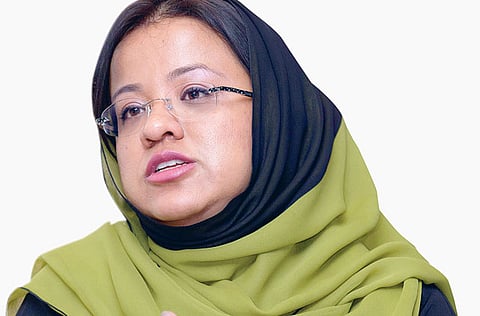Empowering women in UAE
Government is committed to investing in their skills to boost country's growth

Dubai: The role of Emirati woman has been boosted by the backing of the UAE's leadership, Eman Abdullah, president of International Cultural Woman Forum, told Gulf News.
Women's participation in both the private and public sectors is an important step towards boosting the economy through effective participation in different development fields, Eman added.
Eman said that due to the government's effort, particularly by the late Shaikh Zayed Bin Sultan Al Nahyan, Emirati women are now at the forefront of both public and private sectors.
"The UAE leadership is committed to empowering women and investing in their skills for the growth of the country's economy. Therefore, the UAE government provides Emirati women with all facilities that are required to encourage creativity, initiative and decision-making."
Eman underlined that the support to the Emirati woman's achievements continued through the programme of political empowerment of women, which was adopted by President His Highness Shaikh Khalifa Bin Zayed Al Nahyan and the support of His Highness Shaikh Mohammad Bin Rashid Al Maktoum, Vice-President and Prime Minister of the UAE and Ruler of Dubai.
She noted that UAE national women are active partners in the development, constituting 66 per cent of public jobs, of which 30 per cent are leading decision-makers. About 15 per cent of teaching staff at UAE University and 60 per in technical posts, including medicine, teaching, pharmacy and nursing are women. They are also enrolled in the Armed Forces, Police and Customs.
According to the latest statistics, Emirati women now account for 27.95 per cent of the national labour force.
Moreover, on an educational level, nearly half the pupils registered in over 1,250 schools across the UAE are girls; about 75 per cent of all students in the UAE University are women; and three out of every five students in the public higher education system are women.
She remarked that this support is an opportunity for women to go ahead and push for their place as the country evolves.
While there is a political will to empower women and encourage them to reach the top positions in the workforce, Thuraya Jasim, 25, remarked: "Despite the fact that a good number of Emirati women are handling some of the top positions in the government organisations, it is so difficult when it comes to the private sector."
"Private sectors still don't believe in the capability of Emirati women and the role they can play to increase productivity and profitability."
"There should be a kind of awareness about the importance of women's participation not only in the public sector but also in the private sector."
Moreover, she added that although the old perception about women's jobs has almost changed and they can be working in any field, but there are still some families who don't allow their girls to work or even study in the same place with men.
Dr Nadia Buhannad, Leading Sociologist and founder & Managing Director of Sikologia Consultancy & Training, said: "In general, the government and the politics do support and empower women in UAE, but people who work in the government whether they are men or women do their best to make sure the bureaucracy stop women from reaching the top."
Pointing how social barriers could be an obstacle for women empowerment sometimes, she said: "Social barriers do exist indeed, and it is not the government, it is the people and their way of thinking which in many cases is still backwards."
"In UAE you can notice the economic development and the high rise buildings, but when it comes to mentality they need time; and I am not generalising here but talking about the majority. And when it comes to believing in women's ability to run a company or succeed in her career, the barriers are society's beliefs, principles, thoughts, traditions, and values; and this is what forms our mentality."
"My personal belief is that we should stop talking about empowering women at work and start implementing it in real life. I believe that men are not in any good condition themselves, so both men and women need to be empowered in their society, a society where UAE nationals are less than eight per cent," Buhannad said.
Dr Ahmad Samerai, economist, has highlighted the significance of the rapid influx of large numbers of women into the labour market, both in the private and public sectors, during the last decades.
Moreover, he said: "Government recognised that women were key contributors to the economy as well as very effective to enhance the financial situation of the family whether to work at home or in the workplace."
On the regional level, woman could be proved as a major player in the local market and have made a remarkable contribution to the economy, he said.
"UAE is presenting a very clear and great example of the Muslim society where women share and participate in all fields on a par with men," he added.
- 15% teaching women staff at UAE University
- 75% students at the UAE University are women
- 30% women in top firms as decision makers



